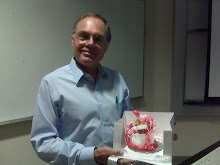Dead Actors, Live Audiences
The following is a MediaNote Classic. It was originally presented to Mass Comm 101 classes in Spring 2018.
If I want to see Spencer Tracy and Katherine Hepburn in a movie, I find a copy of their 1949 film, Adam's Rib. Soon I may be able to see them in a whole now movie created many years after their deaths. Movie technology has advanced to the degree that not only do we have trouble telling animation from live action. We now have difficulty telling live actors from dead ones. NPR reports.
Questions...
•Is this technology good for the movie business or bad for the movie business? Why?
•What jobs will this technology eliminate? What jobs will it create?
•You are a major Hollywood star. How do you use this technology to fund your retirement? How do you use it to provide income for your heirs?
•Will the audience want to see new movies (or TV shows or video games) with John Wayne and Marilyn Monroe in them? In 50 years will audiences want to see new movies with a young Jennifer Lawrence or Johnny Depp?
Labels: advertising, gaming, history, medianoteclassic, movies, television, virtualreality

